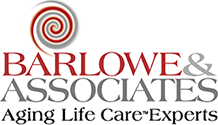If a Senior Loved One is Diagnosed with Alzheimer’s Disease, Can Family Talk to the Doctor?
December 15, 2021 | Memory Care/Mental Health

Everyone in the family is worried about Mom’s memory problems—but she insists nothing is wrong. She had a doctor appointment yesterday. Can family find out what the health care professional thinks? This is a complicated issue with lots of gray areas!
In the earliest stages of Alzheimer’s disease, a senior and their family may be in denial, chalking up memory lapses and personality changes to “just getting older.” A recent study from Johns Hopkins Medicine revealed that over half of people with dementia have never been diagnosed, or told about their diagnosis! But we shouldn’t bury our head in the sand. The earlier that Alzheimer’s disease is diagnosed, the more time the person and family have to begin putting financial, legal and care planning in place.
It’s usually best for the person with dementia to have the full support of family. But it’s not always simple, as many family caregivers will tell you. Seniors in the early stage may fiercely protect their independence. It’s important to overcome this hesitance, because the support of family will become all the more important as the disease progresses.
One question that often arises is whether family members and other caregivers will be permitted to talk to the person’s doctor. An important consideration is that the Health Insurance Portability and Accountability Act (HIPAA) sets boundaries on releasing an individual’s health information. In broad terms, the law gives much control over their medical information and with whom it may be discussed. This law affects whether family are able to talk to their loved one’s doctor.
If you have a loved one who has just been diagnosed, here are steps to take to make sure you have access to the information you need in supporting your loved one.
The importance of naming a healthcare representative
In the early stages of Alzheimer’s, if your loved one allows you to accompany them to doctor’s appointments, permission to participate in the discussion and the exchange of information with the person’s physician is implied. The doctor may ask your loved one for verbal or written permission before releasing information to you.
In later stages, when your loved one can no longer make their own decisions, informal permission may no longer be enough. A solution is for your loved one to appoint you or another trusted friend or relative to serve as their health care representative. An advance directive like this is often called a “durable power of attorney for health care” or “health care proxy.” This document names someone to make healthcare decisions if a person is unable to. And, it gives permission for that person to step into the patient’s shoes with respect to confidential health care information and discussions. This gives the person’s representative access to the information they need in order to understand the person’s care options and make wise, informed decisions on the patient’s behalf.
What if your loved one won’t sign a healthcare appointment?
A spokesperson from the Alzheimer’s Association suggests that if your loved one won’t sign a healthcare appointment, it can be helpful to enlist the help of a trusted third party to encourage them to sign one, perhaps by explaining that it’s beneficial for all concerned. You might ask your loved one’s physician, a member of the clergy, a lawyer, trusted friend, or an Aging Life Care professional (geriatric care manager). Bringing in a third party can help overcome family barriers that may exist and may be viewed by your loved one as having the benefit of an “expert” opinion.
The Alzheimer’s Association also suggests that if a third party is unable to help, it’s important to inform the physician. Ultimately, the physician will need to determine the capacity of your loved one to make decisions. Capacity is not always clear cut, so the unfortunate reality is that without a health appointment there may be a time when the doctor is not at liberty to talk to you.
What about filing for guardianship?
Guardianship is an option when a person with Alzheimer’s reaches the point where they cannot take care of themselves, are deemed incompetent to make decisions, and haven’t completed an advance directive naming a health care representative. The Alzheimer’s Association notes that the process can be time consuming, emotionally draining, and expensive, but is sometimes necessary in order to protect individuals with dementia who do not understand they need help. Guardianship laws differ from state to state, so if your family thinks they need to consider this, consult with an elder care attorney.
Deciding on the right support resources for an older loved one with dementia can be a source of conflict in families. The Care Managers at Barlowe and Associates provide families with services, including education, locating support resources, moderating family meetings, advocacy in accessing public services, providing supervision, and supporting the person with dementia and family every step of the way.
Source: IlluminAge

